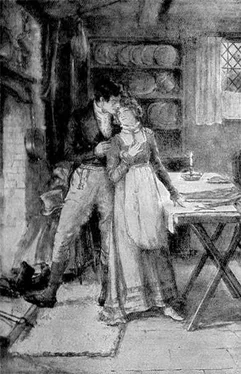Шарлотта Бронте - Shirley
Здесь есть возможность читать онлайн «Шарлотта Бронте - Shirley» весь текст электронной книги совершенно бесплатно (целиком полную версию без сокращений). В некоторых случаях можно слушать аудио, скачать через торрент в формате fb2 и присутствует краткое содержание. Год выпуска: 2014, Издательство: epubBooks Classics, Жанр: Классическая проза, на английском языке. Описание произведения, (предисловие) а так же отзывы посетителей доступны на портале библиотеки ЛибКат.
- Название:Shirley
- Автор:
- Издательство:epubBooks Classics
- Жанр:
- Год:2014
- ISBN:нет данных
- Рейтинг книги:3 / 5. Голосов: 1
-
Избранное:Добавить в избранное
- Отзывы:
-
Ваша оценка:
- 60
- 1
- 2
- 3
- 4
- 5
Shirley: краткое содержание, описание и аннотация
Предлагаем к чтению аннотацию, описание, краткое содержание или предисловие (зависит от того, что написал сам автор книги «Shirley»). Если вы не нашли необходимую информацию о книге — напишите в комментариях, мы постараемся отыскать её.
Shirley — читать онлайн бесплатно полную книгу (весь текст) целиком
Ниже представлен текст книги, разбитый по страницам. Система сохранения места последней прочитанной страницы, позволяет с удобством читать онлайн бесплатно книгу «Shirley», без необходимости каждый раз заново искать на чём Вы остановились. Поставьте закладку, и сможете в любой момент перейти на страницу, на которой закончили чтение.
Интервал:
Закладка:
"I mean to try. But we were talking about Mrs. Pryor. She must be the most unnatural mamma in existence, coolly to let her daughter come out in this weather. Mine was in such a rage because I would go to church; she was fit to fling the kitchen brush after me."
"Mamma was very much concerned about me; but I am afraid I was obstinate. I would go."
"To see me?"
"Exactly; I thought of nothing else. I greatly feared the snow would hinder you from coming. You don't know how pleased I was to see you all by yourself in the pew."
" I came to fulfil my duty, and set the parish a good example. And so you were obstinate, were you? I should like to see you obstinate, I should. Wouldn't I have you in good discipline if I owned you? Let me take the umbrella."
"I can't stay two minutes; our dinner will be ready."
"And so will ours; and we have always a hot dinner on Sundays. Roast goose to–day, with apple–pie and rice–pudding. I always contrive to know the bill of fare. Well, I like these things uncommonly; but I'll make the sacrifice, if you will."
"We have a cold dinner. My uncle will allow no unnecessary cooking on the Sabbath. But I must return; the house would be in commotion if I failed to appear."
"So will Briarmains, bless you! I think I hear my father sending out the overlooker and five of the dyers, to look in six directions for the body of his prodigal son in the snow; and my mother repenting her of her many misdeeds towards me, now I am gone."
"Martin, how is Mr. Moore?"
" That is what you came for, just to say that word."
"Come, tell me quickly."
"Hang him! he is no worse; but as ill–used as ever—mewed up, kept in solitary confinement. They mean to make either an idiot or a maniac of him, and take out a commission of lunacy. Horsfall starves him; you saw how thin he was."
"You were very good the other day, Martin."
"What day? I am always good—a model."
"When will you be so good again?"
"I see what you are after; but you'll not wheedle me—I am no cat's–paw."
"But it must be done. It is quite a right thing, and a necessary thing."
"How you encroach! Remember, I managed the matter of my own free will before."
"And you will again."
"I won't. The business gave me far too much trouble. I like my ease."
"Mr. Moore wishes to see me, Martin, and I wish to see him."
"I dare say" (coolly).
"It is too bad of your mother to exclude his friends."
"Tell her so."
"His own relations."
"Come and blow her up."
"You know that would advance nothing. Well, I shall stick to my point. See him I will. If you won't help me, I'll manage without help."
"Do; there is nothing like self–reliance, self–dependence."
"I have no time to reason with you now; but I consider you provoking. Good–morning."
Away she went, the umbrella shut, for she could not carry it against the wind.
"She is not vapid; she is not shallow," said Martin. "I shall like to watch, and mark how she will work her way without help. If the storm were not of snow, but of fire—such as came refreshingly down on the cities of the plain—she would go through it to procure five minutes' speech of that Moore. Now, I consider I have had a pleasant morning. The disappointments got time on; the fears and fits of anger only made that short discourse pleasanter, when it came at last. She expected to coax me at once. She'll not manage that in one effort. She shall come again, again, and yet again. It would please me to put her in a passion—to make her cry. I want to discover how far she will go—what she will do and dare—to get her will. It seems strange and new to find one human being thinking so much about another as she thinks about Moore. But it is time to go home; my appetite tells me the hour. Won't I walk into that goose? and we'll try whether Matthew or I shall get the largest cut of the apple–pie to–day."
Chapter XXXV
Wherein Matters Make Some Progress, but Not Much
Martin had planned well. He had laid out a dexterously concerted scheme for his private amusement. But older and wiser schemers than he are often doomed to see their finest–spun projects swept to annihilation by the sudden broom of Fate, that fell housewife whose red arm none can control. In the present instance this broom was manufactured out of the tough fibres of Moore's own stubborn purpose, bound tight with his will. He was now resuming his strength, and making strange head against Mrs. Horsfall. Each morning he amazed that matron with a fresh astonishment. First he discharged her from her valet duties; he would dress himself. Then he refused the coffee she brought him; he would breakfast with the family. Lastly, he forbade her his chamber. On the same day, amidst the outcries of all the women in the place, he put his head out of doors. The morning after, he followed Mr. Yorke to his counting–house, and requested an envoy to fetch a chaise from the Red House Inn. He was resolved, he said, to return home to the Hollow that very afternoon. Mr. Yorke, instead of opposing, aided and abetted him. The chaise was sent for, though Mrs. Yorke declared the step would be his death. It came. Moore, little disposed to speak, made his purse do duty for his tongue. He expressed his gratitude to the servants and to Mrs. Horsfall by the chink of his coin. The latter personage approved and understood this language perfectly; it made amends for all previous contumacy. She and her patient parted the best friends in the world.
The kitchen visited and soothed, Moore betook himself to the parlour. He had Mrs. Yorke to appease; not quite so easy a task as the pacification of her housemaids. There she sat plunged in sullen dudgeon, the gloomiest speculations on the depths of man's ingratitude absorbing her thoughts. He drew near and bent over her; she was obliged to look up, if it were only to bid him "avaunt." There was beauty still in his pale, wasted features; there was earnestness and a sort of sweetness—for he was smiling—in his hollow eyes.
"Good–bye!" he said, and as he spoke the smile glittered and melted. He had no iron mastery of his sensations now; a trifling emotion made itself apparent in his present weak state.
"And what are you going to leave us for?" she asked. "We will keep you, and do anything in the world for you, if you will only stay till you are stronger."
"Good–bye!" he again said; and added, "You have been a mother to me; give your wilful son one embrace."
Like a foreigner, as he was, he offered her first one cheek, then the other. She kissed him.
"What a trouble—what a burden I have been to you!" he muttered.
"You are the worst trouble now, headstrong youth!" was the answer. "I wonder who is to nurse you at Hollow's Cottage? Your sister Hortense knows no more about such matters than a child."
"Thank God! for I have had nursing enough to last me my life."
Here the little girls came in—Jessie crying, Rose quiet but grave. Moore took them out into the hall to soothe, pet, and kiss them. He knew it was not in their mother's nature to bear to see any living thing caressed but herself. She would have felt annoyed had he fondled a kitten in her presence.
The boys were standing about the chaise as Moore entered it; but for them he had no farewell. To Mr. Yorke he only said, "You have a good riddance of me. That was an unlucky shot for you, Yorke; it turned Briarmains into an hospital. Come and see me at the cottage soon."
He drew up the glass; the chaise rolled away. In half an hour he alighted at his own garden wicket. Having paid the driver and dismissed the vehicle, he leaned on that wicket an instant, at once to rest and to muse.
"Six months ago I passed out at this gate," said he, "a proud, angry, disappointed man. I come back sadder and wiser; weakly enough, but not worried. A cold, gray, yet quiet world lies round—a world where, if I hope little, I fear nothing. All slavish terrors of embarrassment have left me. Let the worst come, I can work, as Joe Scott does, for an honourable living; in such doom I yet see some hardship but no degradation. Formerly, pecuniary ruin was equivalent in my eyes to personal dishonour. It is not so now; I know the difference. Ruin is an evil, but one for which I am prepared; the day of whose coming I know, for I have calculated. I can yet put it off six months—not an hour longer. If things by that time alter, which is not probable; if fetters, which now seem indissoluble, should be loosened from our trade (of all things the most unlikely to happen), I might conquer in this long struggle yet—I might—good God! what might I not do? But the thought is a brief madness; let me see things with sane eyes. Ruin will come, lay her axe to my fortune's roots, and hew them down. I shall snatch a sapling, I shall cross the sea, and plant it in American woods. Louis will go with me. Will none but Louis go? I cannot tell—I have no right to ask."
Читать дальшеИнтервал:
Закладка:
Похожие книги на «Shirley»
Представляем Вашему вниманию похожие книги на «Shirley» списком для выбора. Мы отобрали схожую по названию и смыслу литературу в надежде предоставить читателям больше вариантов отыскать новые, интересные, ещё непрочитанные произведения.
Обсуждение, отзывы о книге «Shirley» и просто собственные мнения читателей. Оставьте ваши комментарии, напишите, что Вы думаете о произведении, его смысле или главных героях. Укажите что конкретно понравилось, а что нет, и почему Вы так считаете.











